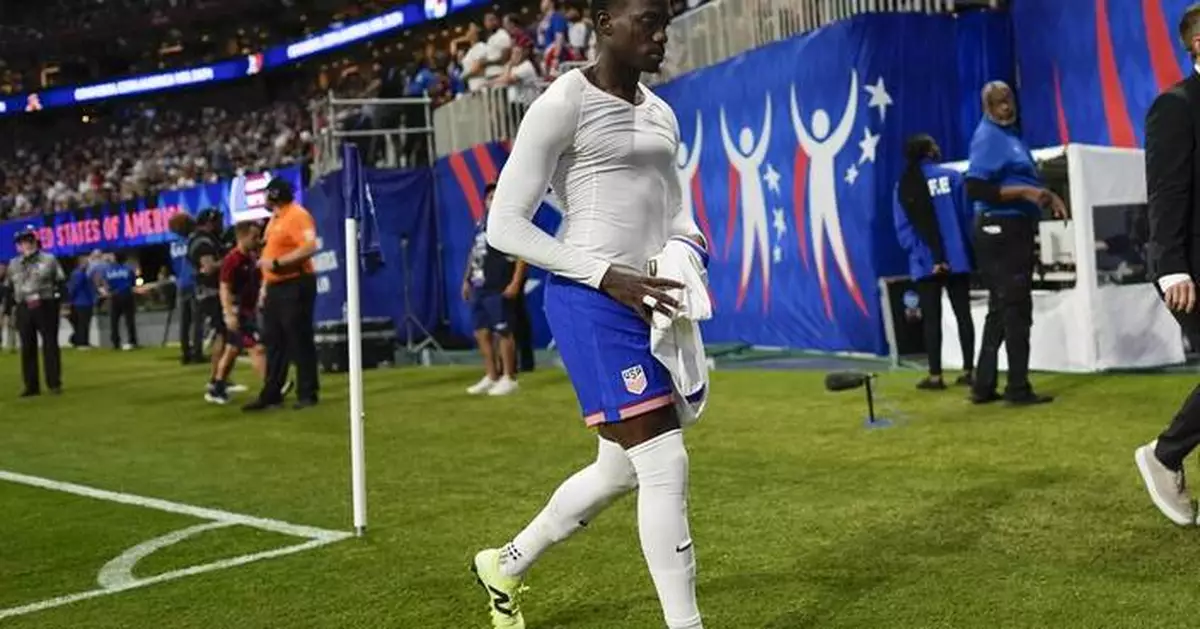ATLANTA (AP) — Tim Weah and other members of the U.S. national team were targeted with racist abuse on social media after the Americans were beaten 2-1 by Panama in the Copa America on Thursday night.
The U.S. Soccer Federation issued a statement saying it was “deeply disturbed with the racist comments made online.”
Weah, who is Black, was sent off with a red card in the 18th minute after punching a Panama player.
It was earliest red card for a U.S. player since Jimmy Conrad was tossed from a 2010 friendly against Honduras.
The short-handed Americans nearly held on for a tie, but Panama scored a late goal that put the U.S. hopes of advancing past the first round in serious jeopardy.
The USSF said several of its players were the targets of racist comments.
“There is absolutely no place in the game for such hateful and discriminatory behavior,” the statement said. “These actions are not only unacceptable but but also contrary to the values of respect and inclusivity that we uphold as an organization.”
The USSF said it will offer mental health services to any player of staff member who requests it. The governing body also reported the racist abuse to CONMEBOL, the South American organizers of the tournament.
“Our organization works continuously toward the evolution of a new culture that eradicates expressions of racism, offensive content on social media and all forms of violence or discrimination," CONMEBOL said in a statement. “We condemn attitudes of intolerance in every place and on every occasion, especially those hiding behind social media accounts.”
Weah issued a public apology on social media for a loss of composure that cost his team dearly.
“No matter what, I will always fight for my team and my country till the day I am no longer needed or capable to!” he said. “I sincerely apologize to everyone. My love for this team goes beyond just football and I am so sad and angry at myself for putting my brothers through what they went through tonight.”
AP soccer: https://apnews.com/hub/soccer

Bolivia's Hector Cuellar jumps to control the ball challenged by Tim Weah of the United States during a Copa America Group C soccer match in Arlington, Texas, Sunday, June 23, 2024. (AP Photo/Julio Cortez)

Tim Weah of the United States leaves the field after receiving a red card during a Copa America Group C soccer match against Panama in Atlanta, Thursday, June 27, 2024. (AP Photo/Mike Stewart)
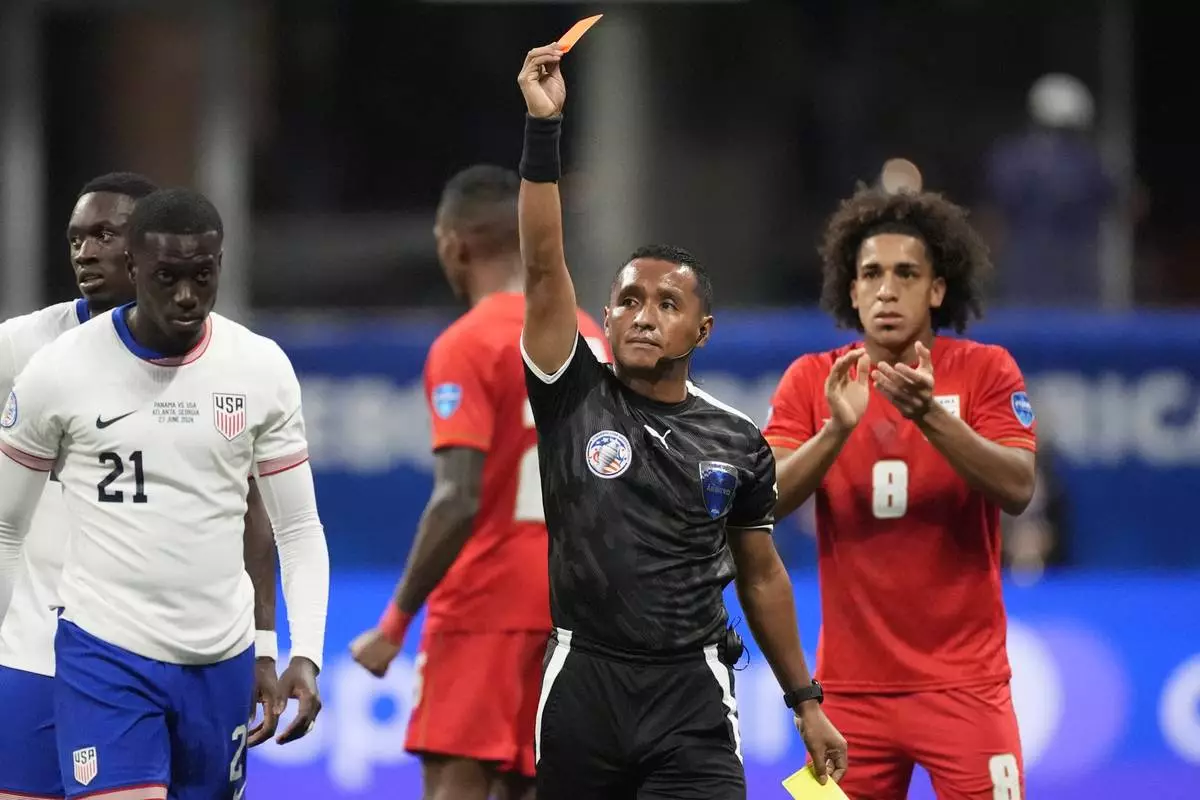
Referee Ivan Barton sends off Tim Weah of the United States, left, during a Copa America Group C soccer match against Panama in Atlanta, Thursday, June 27, 2024. (AP Photo/Mike Stewart)
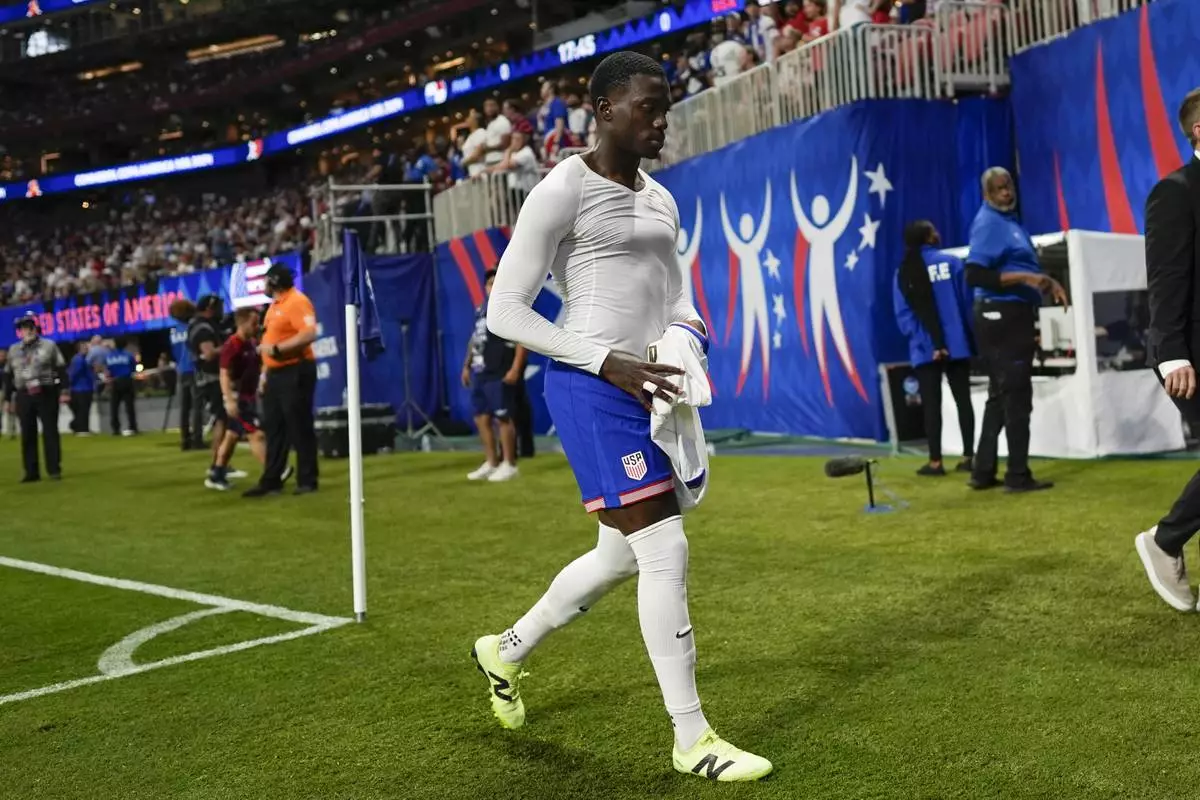
Tim Weah of the United States leaves the field after receiving a red card during a Copa America Group C soccer match against Panama in Atlanta, Thursday, June 27, 2024. (AP Photo/Mike Stewart)
Beginning Monday, a California law will require credit card networks like Visa and Mastercard to provide banks with special retail codes that can be assigned to gun stores in order to track their sales.
But new laws will do the exact opposite in Georgia, Iowa, Tennessee and Wyoming by banning the use of specific gun shop codes.
The conflicting laws highlight what has quietly emerged as one of the nation's newest gun policy debates, dividing state capitols along familiar partisan lines.
Some Democratic lawmakers and gun-control activists hope the new retail tracking code will help financial institutions flag suspicious gun-related purchases for law enforcement agencies, potentially averting mass shootings and other crimes. Lawmakers in Colorado and New York have followed California's lead.
“The merchant category code is the first step in the banking system saying, `Enough! We’re putting our foot down,'” said Hudson Munoz, executive director of the nonprofit advocacy group Guns Down America. "`You cannot use our system to facilitate gun crimes.’”
But many Republican lawmakers and gun-rights advocates fear the retail code could lead to unwarranted suspicion of gun buyers who have done nothing wrong. Over the past 16 months, 17 states with GOP-led legislatures have passed measures prohibiting a firearms store code or limiting its use.
“We view this as a first step by gun-control supporters to restrict the lawful commerce in firearms,” said Lawrence Keane, senior vice president of the National Shooting Sports Foundation, an industry group that backs laws blocking use of the tracking code.
The new laws add to the wide national divide on gun policy. This past week, U.S. Surgeon General Vivek Murthy declared gun violence a public health crisis, citing a rising number of firearm-related deaths, including more than 48,000 in 2022. The move was quickly criticized by the National Rifle Association.
States have dug opposing trench lines on other gun policies. On July 4, for example, Republican-led Louisiana will become the 29th state to allow residents to carry concealed guns without a permit.
By contrast, Democratic-led New Mexico this year tightened laws for people who don't have concealed-carry permits, requiring a seven-day waiting period for gun purchases, which is more than double the three-day period for a federal background check.
States also have responded differently to recent mass shootings. In Maine, where an Army reservist killed 18 people and wounded 13 others, the Democratic-led Legislature passed a variety of new gun restrictions. Following school shootings in Iowa and Tennessee, the Republican-led legislatures there took steps that could allow more trained teachers to bring guns into classrooms.
The surge of legislation targeting firearm store category codes addresses a behind-the-scenes aspect of electronic financial transactions. The International Organization for Standardization, based in Geneva, sets thousands of voluntary standards for various fields, including category codes for all kinds of businesses, from bakeries to boat dealers to bookstores.
Those category lists are distributed by credit card networks to banks, which assign particular codes to businesses whose accounts they handle. Some credit card issuers use the category codes for customer reward points.
The codes can be used by financial institutions to help identify fraud, money laundering or unusual purchasing patterns that are reported as suspicious activities to the U.S. Treasury Department's Financial Crimes Enforcement Network.
Banks and other depository institutions filed more than 1.8 million confidential reports in 2022 flagging more than 5.1 million suspicious activities. About 4% of annual reports lead to follow-up by law enforcement and an even smaller percentage to prosecution, according to the Bank Policy Institute, a trade group representing large banks.
Stores that sell guns have previously been grouped with other retailers in merchant category codes. Some have been classified as sporting goods stores, others as miscellaneous and specialty retail shops.
At the urging of New York-based Amalgamated Bank, which worked with gun-control groups, the International Organization for Standardization adopted a new four-digit category code for gun and ammunition shops in 2022. Major credit card networks initially said they would implement it but backed off under pressure from conservative politicians and the gun industry.
Munoz, who helped lead the effort to establish the firearms store code, noted credit cards were used to buy weapons and ammunition for some of the nation’s deadliest mass shootings.
The intent of a gun merchant code is to spot suspicious patterns, like a person with little history of gun purchases who suddenly spends large amounts at multiple gun stores in a short period. Once alerted by banks, authorities could investigate, potentially thwarting a mass shooting, Munoz said.
California's new law requires credit card networks to make the firearms code available to banks and other financial institutions by Monday. Those entities then have several months to determine which of their business clients should be categorized as gun stores and assign them new codes by May 1.
Visa, the nation's largest payment network, recently updated its merchant data manual to add the firearms code to comply with California's law.
Democratic-led legislatures in Colorado and New York this year also passed firearms code mandates aligned to kick in with California's next May.
“If there was someone suspiciously purchasing a large number of firearms, right now it would be very difficult to tell," said California state Assemblymember Phil Ting, a Democrat who sponsored the new law. “You couldn’t tell if they were soccer balls or golf balls or basketballs."
Even with a firearms store code, it won't be possible to know whether a particular sale is for a rifle, storage safe or some other product such as hunting apparel.
The state laws prohibiting gun store codes have varying effective dates but typically allow state attorneys general to seek court injunctions against financial institutions using the codes, with potential fines reaching thousands of dollars.
The merchant code could lead more people to buy guns with cash instead of credit in order to protect their privacy, said Dan Eldridge, owner of Maxon Shooter’s Supplies in suburban Chicago. Though his business has yet to be recategorized, Eldridge said he already has placed an ATM in his store.
“Viewed most benignly, this code is an effort to stigmatize gun owners," Eldridge said. "But a more worrisome concern is that this is another private sector end run around the prohibition against the federal government creating a gun registry.”
Iowa state Sen. Jason Schultz, a Republican sponsor of legislation banning the firearms code, said he feared federal agents could gain access to data about gun store purchases from financial institutions, then use that as justification to raid gun owners' homes and infringe on their Second Amendment rights.
“States are going to have to make a choice," he said, "whether they want to follow California or whether they’d like to support the original intent of the U.S. Constitution.”
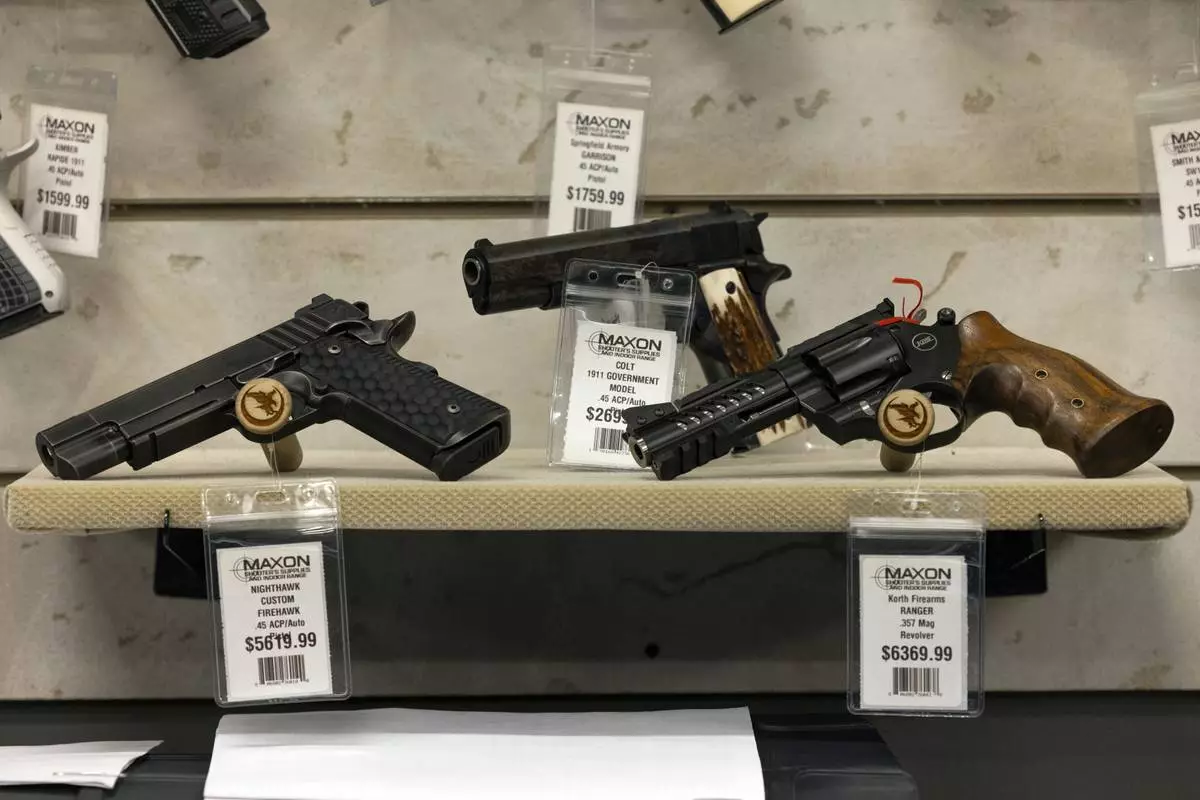
Guns for sale are displayed at Maxon Shooter's Supplies in Des Plaines, Ill., Tuesday, June 25, 2024. A new national divide is emerging among states over whether to track sales by gun stores. A California law taking effect Monday will require credit card networks to provide banks with special retail codes to assign to gun stores. By contrast, new laws taking effect in Georgia, Iowa, Tennessee and Wyoming will prohibit the use of special gun shop codes in financial transactions. A total of 17 states have passed some sort of limit on category codes for gun retailers, while California has been joined by Colorado and New York. (AP Photo/Teresa Crawford)
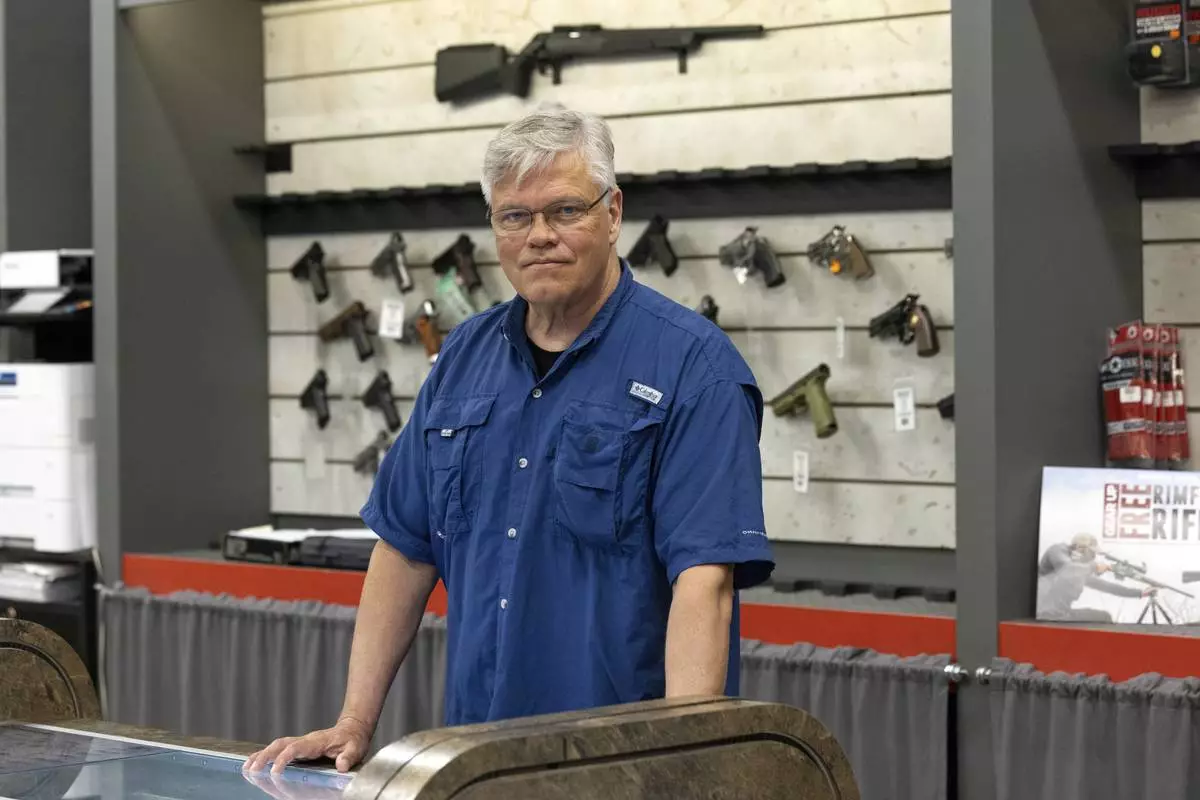
Maxon Shooter's Supplies owner Dan Eldridge poses in his store in Des Plaines, Ill., Tuesday, June 25, 2024. A new national divide is emerging among states over whether to track sales by gun stores. A California law taking effect Monday will require credit card networks to provide banks with special retail codes to assign to gun stores. By contrast, new laws taking effect in Georgia, Iowa, Tennessee and Wyoming will prohibit the use of special gun shop codes in financial transactions. A total of 17 states have passed some sort of limit on category codes for gun retailers, while California has been joined by Colorado and New York. (AP Photo/Teresa Crawford)
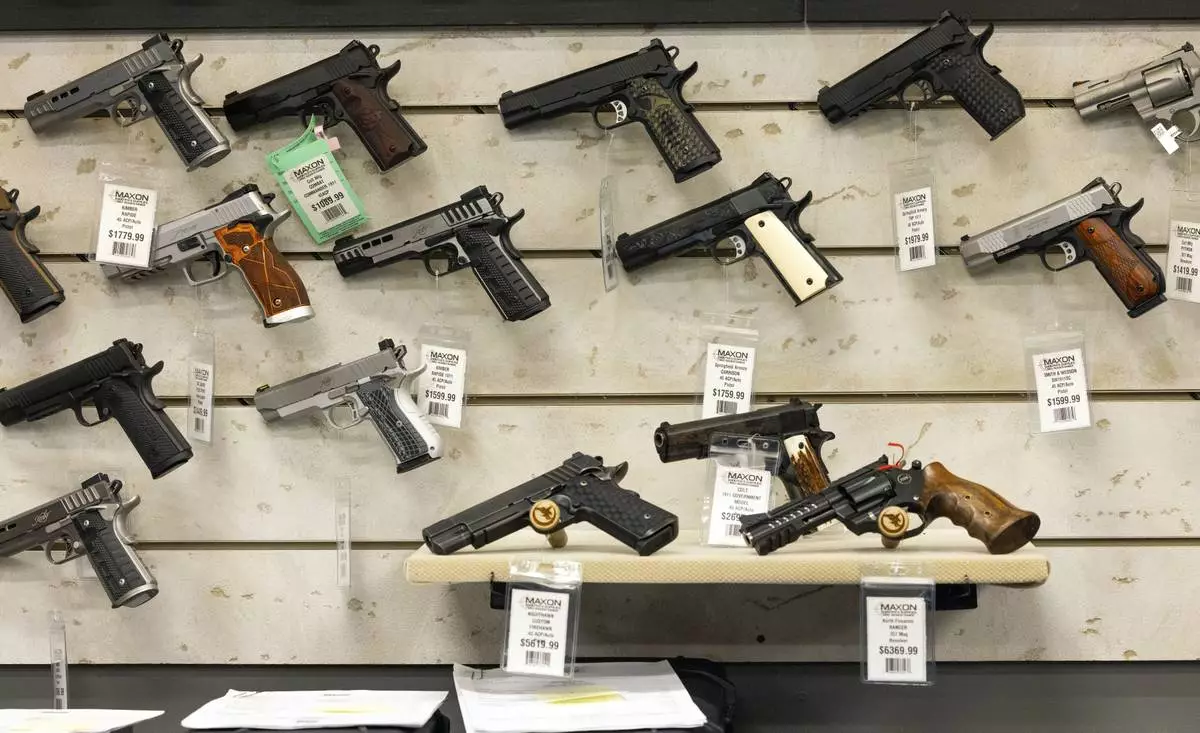
Guns for sale are displayed at Maxon Shooter's Supplies in Des Plaines, Ill., Tuesday, June 25, 2024. A new national divide is emerging among states over whether to track sales by gun stores. A California law taking effect Monday will require credit card networks to provide banks with special retail codes to assign to gun stores. By contrast, new laws taking effect in Georgia, Iowa, Tennessee and Wyoming will prohibit the use of special gun shop codes in financial transactions. A total of 17 states have passed some sort of limit on category codes for gun retailers, while California has been joined by Colorado and New York. (AP Photo/Teresa Crawford)

Maxon Shooter's Supplies owner Dan Eldridge poses in his store in Des Plaines, Ill., Tuesday, June 25, 2024. A new national divide is emerging among states over whether to track sales by gun stores. A California law taking effect Monday will require credit card networks to provide banks with special retail codes to assign to gun stores. By contrast, new laws taking effect in Georgia, Iowa, Tennessee and Wyoming will prohibit the use of special gun shop codes in financial transactions. A total of 17 states have passed some sort of limit on category codes for gun retailers, while California has been joined by Colorado and New York. (AP Photo/Teresa Crawford)






